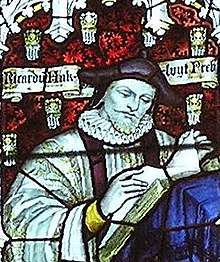Richard Hakluyt
English author, editor and translator (1553–1616)
Richard Hakluyt (1553 – 23 November 1616) was an English writer. He is known for promoting the English colonization of North America through his works, notably Divers Voyages Touching the Discoverie of America (1582) and The Principal Navigations, Voyages, Traffiques and Discoveries of the English Nation (1589–1600).

Quotes
edit- To harpe no longer upon this string, & to speake a word of that just commendation which our nation doe indeed deserve: it can not be denied, but as in all former ages, they have bene men full of activity, stirrers abroad, and searchers of the remote parts of the world, so in this most famous and peerless government of her most excellent Majesty, her subjects through the speciall assistance, and blessing of God, in searching the most opposite corners and quarters of the world, and to speake plainly, in compassing the vaste globe of the earth more then once, have excelled all the nations and people of the earth.
- 'The Epistle Dedicatorie', The Principal Navigations, Voyages, Traffiques and Discoveries of the English Nation, Vol. I [1589] (1885), p. 6
Quotes about Richard Hakluyt
edit- The two editions of Hakluyt's Principall Navigtions, in 1589 and 1598–1600 respectively, embodied twenty years of concerted effort to build a tradition of maritime enterprise and achievement. This again was based in medieval record and legend and so showed the multiple initiatives of Tudor times in perspective, implying a national destiny. Moreover Hakluyt brought together the minds of those concerned, from ordinary seamen to lord admirals, from tourists in the Middle East to City magnates and royal favourites, and he engaged the support of those most committed to expansion, notably Richard Staper, Anthony Jenkinson and Michael Lok, all merchant pioneers, Sir John Hawkins, Ralegh and, above all, Walsingham. Thus Hakluyt did more than anyone to integrate and organize the disparate personalities, experiences and aspirations into a movement with a common consciousness and harnessed the horses of nationalism to the chariot of empire.
- Kenneth Andrews, Trade, Plunder and Settlement: Maritime Enterprise and the Genesis of the British Empire, 1480–1630 (1984), pp. 35-36
- The sea-war in general and privateering in particular did much to associate English nationalism with militant maritime expansion. In attitudes at least the war marked a turning point, signalized by the publication of Hakluyt's Principall Navigations in the year after the Armada and of its extended edition in 1598–1600. Hakluyt's message of oceanic imperialism conquered the reading public with such triumphant ease because the public mind was now ready to accept it.
- Kenneth Andrews, Trade, Plunder and Settlement: Maritime Enterprise and the Genesis of the British Empire, 1480–1630 (1984), p. 248
- And yet those five volumes may be called the Prose Epic of the modern English nation. They contain the heroic tales of the exploits of the great men in whom the new era was inaugurated; not mythic, like the Iliads and the Eddas, but plain broad narratives of substantial facts, which rival legend in interest and grandeur. What the old epics were to the royally or nobly born, this modern epic is to the common people.
- James Anthony Froude, Short Studies on Great Subjects, Vol. II (1867), pp. 105-106